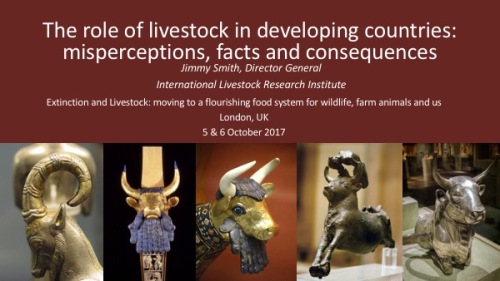
Jimmy Smith, the director general of the International Livestock Research Institute (ILRI), is in London today (5 Oct 2017), speaking at an Extinction and Livestock Conference organized by Compassion in World Farming and the World Wildlife Fund.
Smith makes his presentation at 2:50pm today London time (4:50pm Nairobi time).
Here’s what this livestock-for-development leader is saying to his (largely vegan/vegetarian) audience.




Is livestock production responsible for the destruction of habitats, damaging biodiversity through: over-grazing, cultivation of pastures and feed crops?
Smith tells his audience that moderate grazing is good for the diversity of both wildlife and plants, that 57% of land used for feed production is unsuitable for crop production, that 86% of the dry matter consumed by animals cannot be consumed b y humans, and that diets with some animal-source foods use less land than vegan alternatives.
Is livestock production a major cause of climate change through greenhouse gas emissions from animals, land clearing for pastures and feed crops?
Smith says that greenhouse gas emissions from livestock are about 14% of all human-induced emissions (less than transport, energy and industry) Within agriculture, which makes up 24% of global emissions, livestock presents the biggest opportunity to reduce emissions—by at least 30%. Livestock are essential for resilient food systems (manure, traction, risk management).
Is consumption of animal-source foods bad for your health causing—obesity, cancers, diabetes, food-borne disease?
Smith tells his audience that 30% of the world’s protein comes from animal-source foods. And that animal-source foods contain B12, micronutrients and more bioavailable macronutrients than plant-based foods. Animal-source foods are essential in the first 1000 days of life, Smith says. And while milk improves growth, preventing stunting in children, consumption of small amounts of meat improves cognitive ability.








You can view this presentation on ILRI Slideshare or go to the following Pinterest boards to view a collection of all (1) slide presentations by Jimmy Smith, (2) slide presentations by selected other ILRI staff, and (3) major opinion pieces published by ILRI staff.
Thanks & congratulations, Dr Jimmy Smith, for this presentation where the important role of livestock in economic development & environment has been demonstrated.
Good collection of facts but we have to start a follow up programme and how constrains can be solved practically.
The points raised by Jimmy Smith are utterly valid. Most developing countries need to have a deeper look into this.
Thank you Dr Jimmy and Dr Getachew too. No country in the planet reached to the level of economic self sustenance ignoring the livestock sector.
I love this presentation.It is brief and on point.
I like this presentation. Brief and on point!
Thank you very much Dr Jimmy for raising the important issues and Dr Getachew for sharing the information. I believe still the challenge is to convince non-livestock development practitioners, researchers and academia, policymakers and funding agencies.